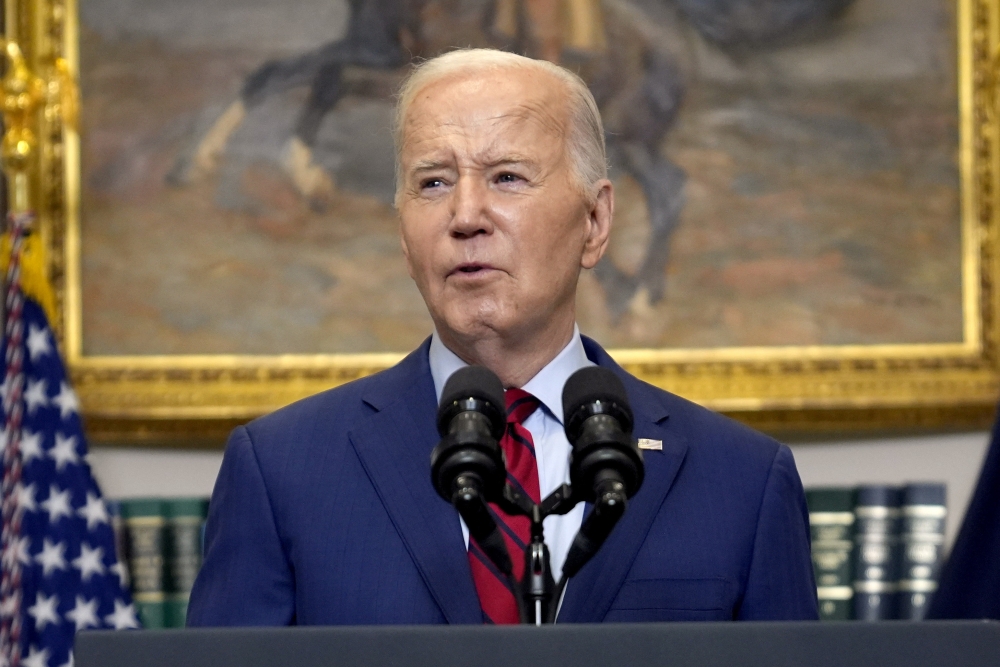Politics
Behind the Scenes, G7 Nations Wrangle Over Ambitious Climate Commitments

In theory, the world’s largest industrialized democracies have agreed to stop using fossil fuels within a little over a quarter-century and to switch to new sources of power such as solar and wind as fast as they can.
But as leaders of the Group of 7 gathered in Hiroshima, Japan, this weekend for their annual meeting, some countries were wrangling over whether to loosen commitments to phase out the use of carbon-emitting fuels like gas and coal in time to avert the worst effects of global warming.
The final communiqué from the summit, released on Saturday afternoon, included language sought by Japan that blesses continued investment in certain types of coal-fired power plants that the Japanese government is helping to finance. But leaders only modestly modified language from last year’s meeting that supported some new investment in natural gas infrastructure. Germany, which pushed for the endorsement in 2022 as it scrambled to replace Russian gas imports in the wake of the invasion of Ukraine, had sought to broaden the wording this year.
The behind-the-scenes battle underscored the political, economic and practical challenges that many Group of 7 nations have run into as they seek to accelerate a global energy transition with trillions of dollars in government incentives.
Jarred by the invasion of Ukraine, countries in Europe are seeking to quickly secure sources of natural gas to keep the lights on. At the same time, countries like Japan and even to some degree the United States are seeking to protect longstanding investments in the fossil fuel industry at home or abroad.
The United States and its allies have moved quickly over the last year to incentivize investments in wind and solar power, electric vehicles, technology to aid energy efficiency and other measures meant to reduce greenhouse gas emissions and slow global temperature rise. At the same time, they have taken what officials call temporary but crucial measures to keep fossil fuels flowing to global markets, both to avert an electricity crisis in Europe and to hold down gasoline prices around the world.
Those efforts include a price-cap measure for Russian oil that was being hailed as a success at the meetings this weekend. The cap effectively allows Russia to continue exporting oil, but at a discount; keeping its crude on the market has helped to hold down global gasoline prices.
But tensions have flared in the coalition over efforts by some countries to lock in their access to fossil fuels for decades to come. According to three people familiar with the discussions, the German government, concerned about securing enough energy to power its economy, pushed in Hiroshima to loosen the language that leaders released last year just months after the start of Russia’s war on Ukraine.
The 2022 communiqué endorsed public investment in gas, but only in “exceptional circumstances” and as a “temporary response” to relieve nations from dependency on Russian energy. Any expansion, the statement said, should not derail nations from their pledges to slash greenhouse gas emissions. The 2023 statement repeated that language and did not go much further.
“It is necessary to accelerate the phaseout of our dependency on Russian energy, including through energy savings and gas demand reduction, in a manner consistent with our Paris commitments,” it read, referring to the landmark Paris climate agreement, “and address the global impact of Russia’s war on energy supplies, gas prices and inflation, and people’s lives, recognizing the primary need to accelerate the clean energy transition.”
Britain and France fought the German effort. The Biden administration found itself caught between defending the president’s own ambitious climate change agenda and aiding other United States allies intent on increasing their access to fossil fuels.
The sudden promotion of such fuels has alarmed environmental activists who say that endorsing public investment in gas is incompatible with the pledge nations made in Glasgow, Scotland, in 2021 to keep global temperature rise to 1.5 degrees Celsius, or 2.7 degrees Fahrenheit, above preindustrial levels.
“The G7 must clearly state how they intend to keep the 1.5 degree Celsius limit alive and spur on a global shift to clean energy,” said Mary Robinson, a former president of Ireland. “This is a moment. The climate crisis is upon us.”
Britain and France argue that the immediate energy crisis has passed and that Europe has averted a potential power shortage this winter. Germany has already built its first liquefied natural gas terminal and is hoping to build more.
Japan also has an interest in further natural gas development. During a meeting of environment ministers from Group of 7 nations in Sapporo, Japan, last month, Japanese representatives pushed the group to permit further investment in developing gas fields in Asia, according to environmental activists.
An official in the Japanese foreign ministry who spoke on the condition of anonymity said that Japan, which relies on energy imports, needed natural gas for its energy security and also wanted to help other countries use liquefied natural gas as a way to transition away from coal.
Kaname Ogawa, director of the electricity infrastructure division at the Ministry of Economics, Trade and Industry, said that Japan was committed overall to reducing its reliance on natural gas, but that it had sought new contracts to import gas as others had expired. Liquefied natural gas accounts for more than a third of Japan’s power generation, and close to 10 percent of that gas comes from Russia.
Japan already pushed hard at the Sapporo meeting to prevent the environment ministers from committing the Group of 7 to a firm date for phasing out coal. Unlike the other countries in the grouping, Japan, which derives close to 30 percent of its energy from coal, refused to sign on to a 2030 date for bringing that down to zero.
“Our electricity structure differs significantly from other countries,” Mr. Ogawa said. “We will introduce renewables and we will increase non-fossil fuels as much as possible, but at the same time, in order to maintain our electricity security, we have to continue to use” coal.
The government is financing efforts to use ammonia in coal-fired plants to make them more efficient, a technology it has marketed as “clean coal.” The communiqué on Saturday specifically cited ammonia and said such efforts “should be developed and used, if this can be aligned with a 1.5 degrees Celsius pathway, where they are impactful as effective emission reduction tools to advance decarbonization across sectors and industries.”
Activists worry that Japan’s timeline for developing its ammonia technology is too long for it to help with climate goals.
“The new technology cannot come in a timely manner in order to achieve a 2030 coal phaseout timeline,” said Kimiko Hirata, founder of Climate Integrate, an advocacy group. “It will be developed and deployed only after 2030, so this technology is not compatible with the 1.5 degree goal.”
That goal will not be achievable if countries continue to develop new sources of fossil fuels, according to the International Energy Agency. The atmosphere has already warmed 1.1 degrees above preindustrial levels and is hurtling toward that planetary boundary.
In a “clean energy economy action plan” released on Saturday, the Group of 7 acknowledged “that there are various pathways according to each country’s energy situation, industrial and social structures, and geographical conditions.”
A senior U.S. official said the Biden administration was insisting on “no climate backsliding” in the gas investment language. The official, who spoke on the condition of anonymity, said public funding for gas infrastructure should be allowed only in “narrow circumstances” and should still be consistent with countries’ plans to stop adding greenhouse gases to the atmosphere before 2050.
Hikari Hida contributed reporting from Hiroshima, Japan.

Politics
Trump slams 'radical left lunatics' creating chaos on college campuses nationwide
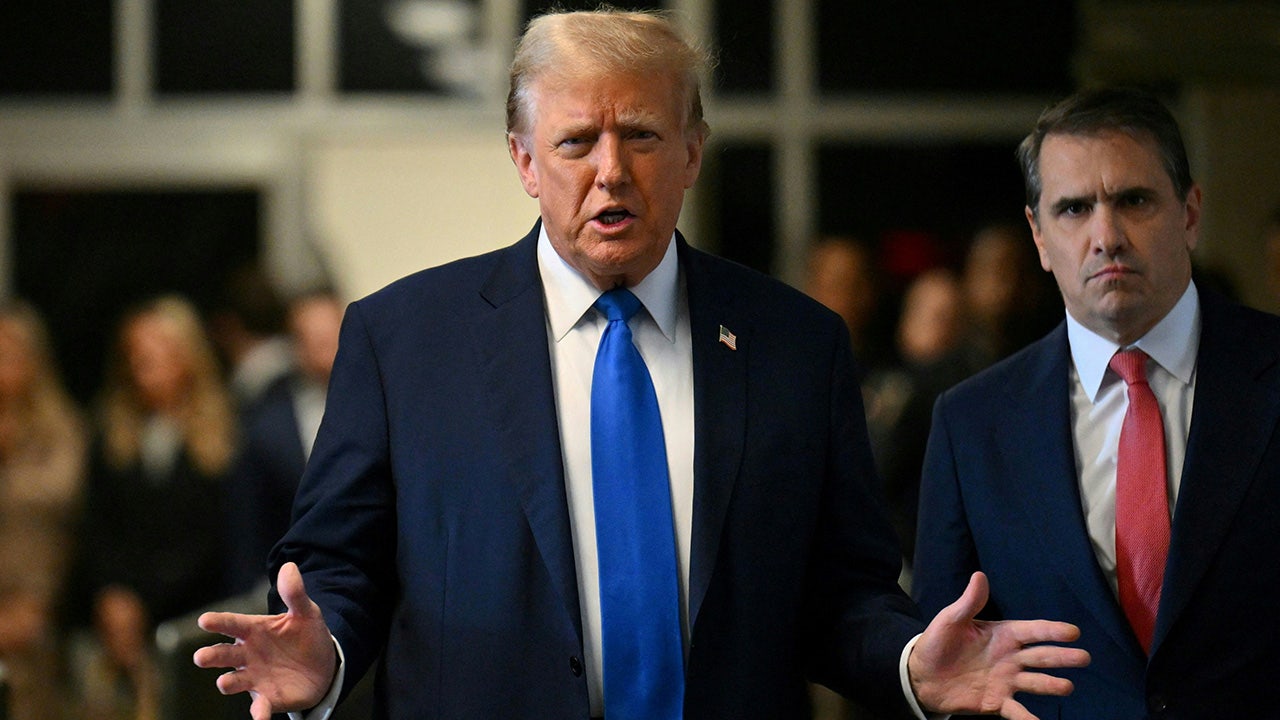
Former President Trump slammed the anti-Israel “radical left lunatics” creating chaos at colleges nationwide, highlighting that the antisemitism on campuses is promoted by the left, not conservatives.
“This is a movement from the left. These are radical left lunatics, and they’ve got to be stopped now because it’s going to go on and on. And it’s going to get worse, and worse,” Trump said Thursday morning outside of a Manhattan courtroom where he is standing trial.
“And, you know, they take over countries, and we’re not letting them take over the USA. We’re not letting the radical left morons take over this country.”
Student agitators have infiltrated college campuses nationwide in recent weeks, including radicals on Columbia University’s campus taking over the campus’ Hamilton Hall building, while schools such as UCLA, Harvard and Yale are working to clear student encampments where protesters demand their elite schools completely divest from Israel.
LIVE UPDATES: NY V. TRUMP TRIAL TO RESUME WITH GAG ORDER PROCEEDINGS AFTER JUDGE FINES TRUMP $9K
Former President Trump speaks to the media as he leaves Manhattan Criminal Court on April 22, 2024, in New York City. Trump faces 34 felony counts of falsifying business records in the first of his criminal cases to go to trial. (Brendan McDermid-Pool/Getty Images)
The protests are associated with groups tied to far-left organizations backed by dark money and liberal mega-donor George Soros, Fox News Digital previously reported. Namely, the National Students for Justice in Palestine (NSJP) has had a large presence amid the protests on Columbia University’s campus, as well as on the campuses of UCLA, Tufts and the University of Texas at Austin.
In his remarks Thursday, Trump praised law enforcement officers in New York City and Los Angeles for working to clear encampments and Columbia’s Hamilton Hall, and make arrests amid the chaos.
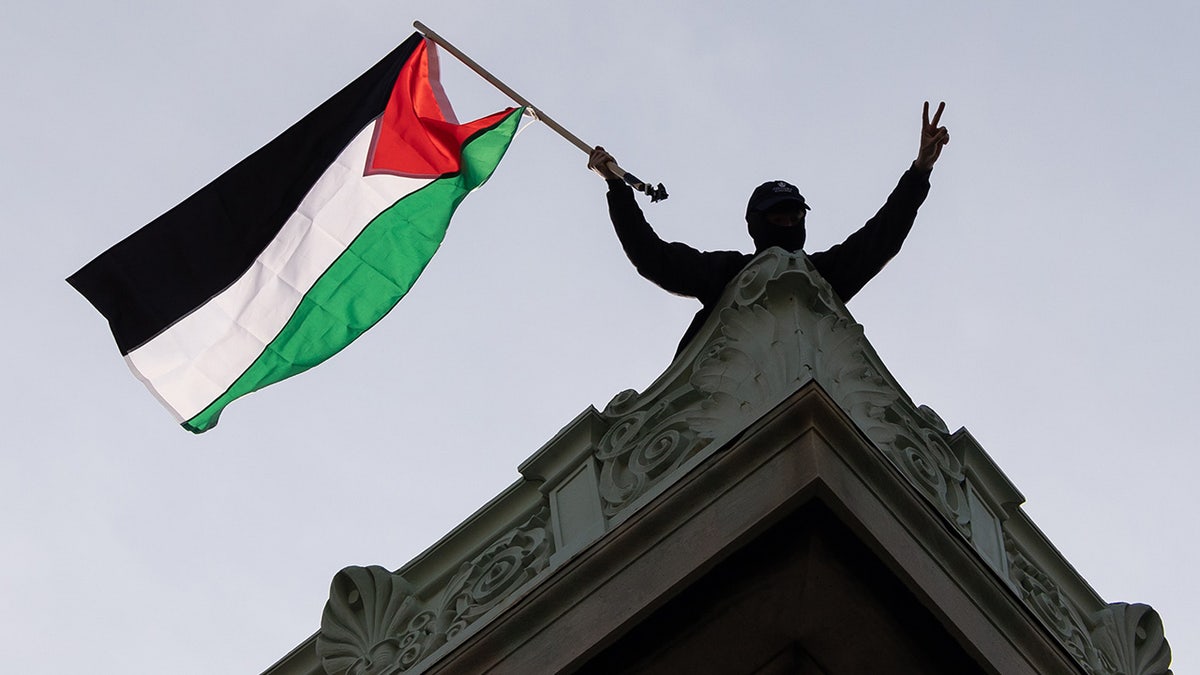
An anti-Israel demonstrator holds a Palestinian flag on the rooftop of Hamilton Hall at Columbia University in New York, on Tuesday, April 30, 2024. (Yuki Iwamura/Bloomberg via Getty Images)
NY V TRUMP TO RESUME WITH GAG ORDER HEARING AFTER TRUMP FINED $9K, THREATENED WITH JAIL TIME
“I’m so proud of the New York’s finest… I know so many of them. They’re incredible. They did a good job at Columbia and likewise in Los Angeles. They did a really good job at UCLA. It was very much embedded,” Trump continued.
“And just so you understand, this is the radical left. This is a movement from the left, not from the right. The right is not your problem. Despite what law enforcement likes to say, the FBI director said that he worries about the right.”
JUDGE FINES TRUMP THOUSANDS OVER VIOLATING GAG ORDER, WARNS ‘INCARCERATORY PUNISHMENT’ COULD BE NEXT
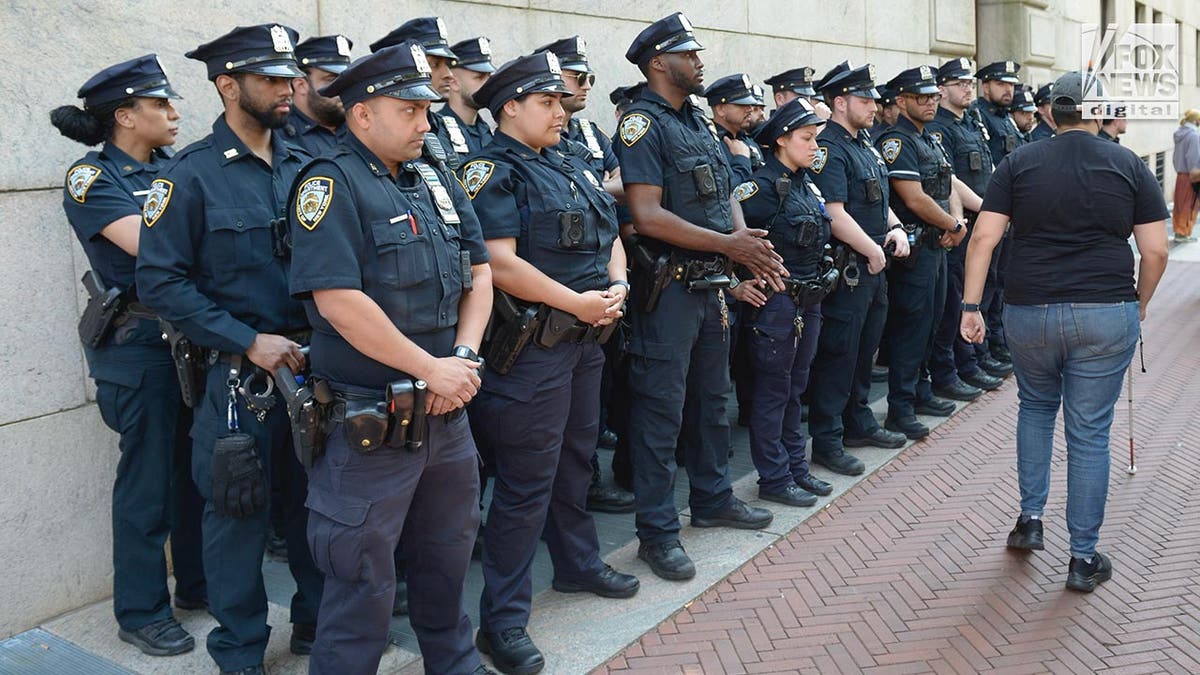
NYPD officers line up outside Columbia University, Monday, April 29, 2024. (Rashid Umar Abbasi for Fox News Digital)
The NY v. Trump case focuses on Trump’s former personal attorney, Michael Cohen, paying former pornographic actor Stormy Daniels $130,000 to allegedly quiet her claims of an alleged extramarital affair she had with the then-real estate tycoon in 2006. Trump has denied having an affair with Daniels.
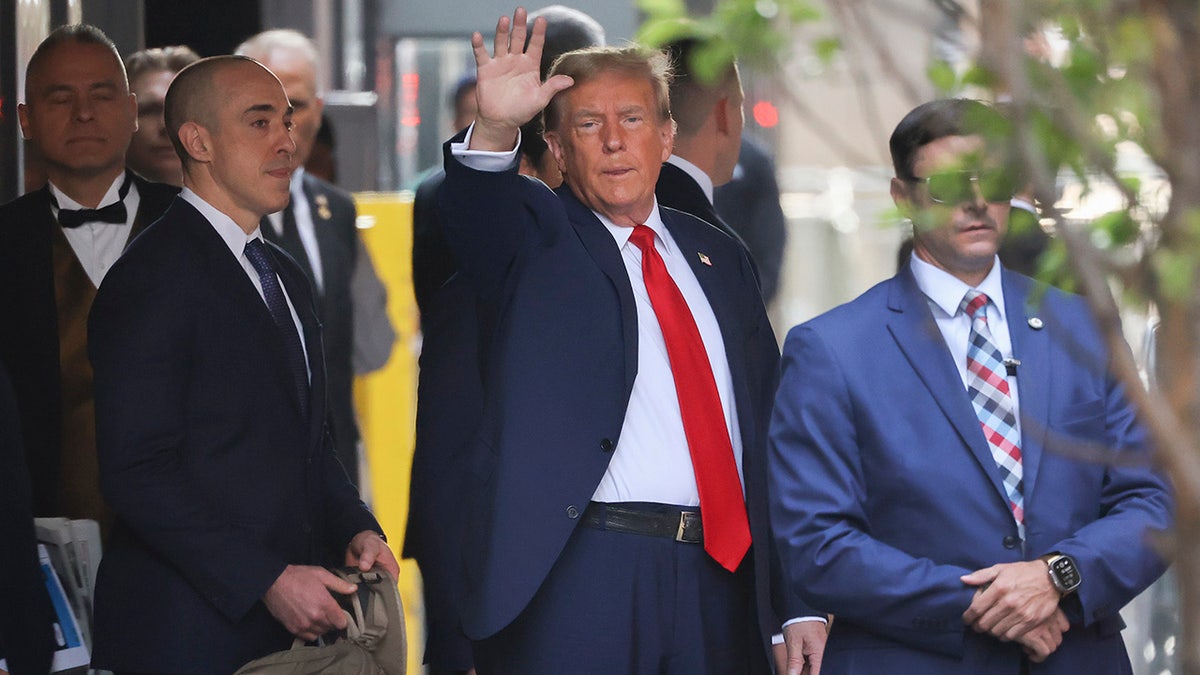
Former President Trump leaves Trump Tower on his way to Manhattan Criminal Court, April 15, 2024, in New York. (AP Photo/Yuki Iwamura)
Prosecutors allege that the Trump Organization reimbursed Cohen and fraudulently logged the payments as legal expenses. Prosecutors are working to prove that Trump falsified records with the intent to commit or conceal a second crime, which is a felony, in violation of a New York law called “conspiracy to promote or prevent election.”
Politics
Opinion: Kristi Noem executed her dog. That's not the main reason she'd be a lousy vice president

People think I’m a cat lady, but that’s only because dogs are high-maintenance and for years I traveled often. I’m that person dog walkers dread: the dog lover who stops them so that I, a stranger, can give their hound some love.
Naturally, I was among the millions of people sickened on learning that South Dakota Gov. Kristi Noem once executed her puppy, Cricket, in a gravel pit, apparently for being puppy-like. And save some tears for the pet goat she next dragged to the killing field and shot, simply for being rambunctious and “rancid.”
Noem’s account in a coming memoir, apparently intended to show her guts, grit and gunplay as she auditions to be Donald Trump’s running mate, instead had the rare effect of bringing Americans of all political persuasions together — in revulsion at her.
Opinion Columnist
Jackie Calmes
Jackie Calmes brings a critical eye to the national political scene. She has decades of experience covering the White House and Congress.
“Kristi Noem manages to unify the left and right, the woke and Q-anon, the trans and homophobes unanimously around the proposition that she is a monster,” right-wing pundit Ann Coulter posted on X.
Trump hasn’t weighed in on Puppygate. (He did, however, provide a blurb for Noem’s book: “You’ve got to read it!” Did he?) Perhaps he’s been distracted because he’s penned up in a Manhattan criminal court. Or maybe because he’s that rare breed that doesn’t seem to like dogs; Trump is the only president in a century who hasn’t owned one. He does have dogs on his mind a lot, but always when he’s barking pejoratively about women, terrorists and political enemies (“choked like a dog,” “dumped liked a dog,” looks like “a dog,” “died like a dog”).
Yet Trump aides, hiding behind a cloak of anonymity, have been quick to confirm the conventional wisdom: Noem is almost certainly disqualified as Trump’s choice for vice president. As the pun-intended headline in the Murdochs’ New York Post put it this week, “Kristi Noem has ‘no shot’ as Trump’s VP pick after puppy-killing controversy: sources.”
And that’s what sickens me now: There is so much that should disqualify Noem from being first in line for the presidency — starting with the fact that she questions Joe Biden’s election and supported Trump’s efforts to overturn the result and resist the peaceful transfer of power — yet it took a puppy’s killing to actually disqualify her.
What a testament to our warped politics.
Every other Republican said to be on Trump’s shortlist similarly seconds his false, antidemocratic grievances about 2020. And yes, I understand that when the man at the top of the ticket is the election-denier and insurrection-inciter in chief, it follows that he’ll want as his No. 2 a candidate who echoes his utterances and snaps to his commands — like a dog, right?
Or, like Sens. Tim Scott of South Carolina, Marco Rubio of Florida and J.D. Vance of Ohio; Reps. Elise Stefanik of New York and Byron Donalds of Florida; North Dakota Gov. Doug Burgum, and Trump rival-cum-sycophant Vivek Ramaswamy, among other would-be lapdogs eager for his nod.
During the 2016 campaign, then-rival Rubio snarled about Trump: “For years to come, there are many people on the right, in the media and voters at large that are going to be having to explain and justify how they fell into this trap of supporting Donald Trump.” Now — after Trump’s impeachments, an insurrection and four indictments — it’s Rubio who’s fully entrapped. This week he was tweeting against the “Biden supporter democrat ‘judge’” in Trump’s New York hush-money trial. Just like his master.
Vance is another aspirant who has rolled over for Trump. “I’m a Never Trump guy,” he said in 2016, and he suggested to a friend that Trump might be “America’s Hitler.” But on ABC’s “This Week” in February, Vance lashed out at host George Stephanopoulos for even asking about the events surrounding Jan. 6, and then admitted he’d have refused to certify Biden’s election had he been vice president.
As Vance and the rest of the veep wannabes know, Trump demands complete loyalty. (So why doesn’t he have a dog?)
Noem was relatively early to endorse Trump for reelection, at a September rally in South Dakota. Back then she said she’d be his veep nominee “in a heartbeat,” adding, “Trump needs a strong partner if he’s going to take back the White House.”
And just how does a woman demonstrate she’s got such strength, at least to Trump and MAGA world? Noem decided one way was to write her self-promoting book, “No Going Back,” and include anecdotes like the multipage account of shooting Cricket, a 14-month-old wirehaired pointer, and a family goat.
In her telling, first disclosed by the Guardian, the puppy had an “aggressive personality” and, “out of her mind with excitement,” disrupted a pheasant hunt — and attacked a neighbor’s chickens like “a trained assassin.” Noem grabbed a gun and took Cricket to the pit: “It was not a pleasant job, but it had to be done.” Then she figured she might as well dispatch the “nasty and mean” goat, too. It required two shots.
What strength. Amid days of denunciations, the supposedly strong Noem stuck to her guns, posting online about how the episode underscored her ability to make “tough decisions” and her knack for “real, honest, and politically INcorrect stories.”
As fed up as Secret Service agents must be with Biden’s bite-happy German shepherd, Commander, it’s hard to believe any of them want to draw their guns on him like Noem did with poor Cricket.
I hope she did kill her veep prospects. I’m just sorry it’s not for the right reasons.
Politics
The White House has a new curator. Donna Hayashi Smith is the first Asian American to hold the post

The White House has a new curator and Donna Hayashi Smith is the first Asian American to hold the post.
The White House announced her appointment Wednesday, the start of Asian American, Native Hawaiian and Pacific Islander Heritage Month.
WHITE HOUSE DENIES SECRET PLOT TO OUST KARINE JEAN-PIERRE AS BIDEN FACES MORE BAD NEWS
Originally from Wahiawa, Hawaii, Hayashi Smith joined the White House curator’s office in 1995 and has now served under five presidents. She had been serving in an acting capacity since last year after the retirement of her predecessor, Lydia Tederick.
The White House is photographed from Lafayette Park on Wednesday, May 1, 2024, in Washington. The White House has a new curator and Donna Hayashi Smith is the first Asian American to hold the post. Hayashi Smith had been serving in an acting capacity since last year. She will oversee the care of thousands of artifacts in the White House collection, cataloging and preserving everything from presidential portraits to furniture to the china place settings. (AP Photo/Jon Elswick)
As curator, Hayashi Smith will oversee the care of thousands of artifacts in the White House collection, cataloguing and preserving everything from presidential portraits to furniture and more.
Hayashi Smith led the curator’s office through a process in 2022 to ensure that the White House continues to be recognized nationally as an accredited museum.
First lady Jill Biden cited Hayashi Smith’s service under five presidential administrations and said she looked forward to working with her to preserve the White House’s “living history.”
-

 News1 week ago
News1 week agoLarry Webb’s deathbed confession solves 2000 cold case murder of Susan and Natasha Carter, 10, whose remains were found hours after he died
-

 Education1 week ago
Education1 week agoVideo: Dozens of Yale Students Arrested as Campus Protests Spread
-

 World1 week ago
World1 week agoHaiti Prime Minister Ariel Henry resigns, transitional council takes power
-

 News1 week ago
News1 week agoFirst cargo ship passes through new channel since Baltimore bridge collapse
-

 World1 week ago
World1 week agoUS secretly sent long-range ATACMS weapons to Ukraine
-

 World1 week ago
World1 week agoSpanish PM Pedro Sanchez suspends public duties to 'reflect'
-

 News1 week ago
News1 week agoAmerican Airlines passenger alleges discrimination over use of first-class restroom
-

 Education1 week ago
Education1 week agoVideo: Johnson Condemns Pro-Palestinian Protests at Columbia University





